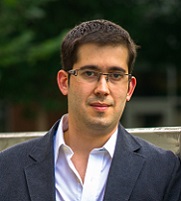Terahertz Communications: From Nanomaterials to Ultra-broadband Networks

Part of the Special Joint ECE and NYU WIRELESS Seminar Series
Circuits: Terahertz (THz) and Beyond
Title:
Terahertz Communications: From Nanomaterials to Ultra-broadband Networks
Speaker:
Josep Miquel Jornet, Ph.D.
- Assistant Professor in the Electrical Engineering Department at the University at Buffalo
- Director at UB Nano Lab
Research website: UB Nano Lab
Abstract:
Wireless data traffic has grown exponentially in recent years due to a change in the way today's society creates, shares and consumes information. This change has been accompanied by an increasing demand for higher speed wireless communications, anywhere, anytime. Following the current trend, wireless Terabit-per-second (Tbps) links are expected to become a reality within the next ten years. In this context, Terahertz (THz)-band (0.1-10 THz) communication is envisioned as a key wireless technology of the next decade. The THz band will help overcome the spectrum scarcity problems and capacity limitations of current wireless networks, by providing an unprecedentedly large bandwidth. In addition, THz-band communication will enable a plethora of long-awaited applications, both at the nano-scale and at the macro-scale, ranging from wireless massive-core computing architectures and instantaneous data transfer among non-invasive nano-devices, to ultra-high-definition content streaming among mobile devices and wireless high-bandwidth secure communications. In this seminar, an in-depth view of THz-band communication networks will be provided. First, the state of the art and open challenges in the design and development of THz transceivers and antennas will be presented, with special emphasis on novel hybrid graphene/semiconductor plasmonic devices. Then, the current progress and future research directions in terms of channel modeling, physical and link layers design, will be tackled in a bottom-up approach, defining a roadmap for the development of this next frontier in wireless communication.
Bio:

Josep M. Jornet is an Assistant Professor in the Department of Electrical Engineering at the University at Buffalo (UB), The State University of New York. He received the B.S. in Telecommunication Engineering and the M.Sc. in Information and Communication Technologies from the Universitat Politecnica de Catalunya, Barcelona, Spain, in 2008. He received the Ph.D. degree in Electrical and Computer Engineering from the Georgia Institute of Technology (Georgia Tech), Atlanta, GA, in 2013. From September 2007 to December 2008, he was a visiting researcher at the Massachusetts Institute of Technology (MIT), Cambridge, under the MIT Sea Grant program. He was the recipient of the Oscar P. Cleaver Award for outstanding graduate students in the School of Electrical and Computer Engineering, at Georgia Tech in 2009. He also received the Broadband Wireless Networking Lab Researcher of the Year Award in 2010. In 2016, 2017 and 2018, he received the Distinguished TPC Member Award at the IEEE International Conference on Computer Communications (INFOCOM). In 2017, he received the IEEE Communications Society Young Professional Best Innovation Award, the ACM NanoCom Outstanding Milestone Award and the UB SEAS Early Career Researcher of the Year Award. In 2018, he received the UB Exceptional Scholar Award, Young Investigator Award. His current research interests are in Terahertz-band communication networks, Wireless Nano-bio-sensing Networks, and the Internet of Nano-Things. In these areas, he has co-authored more than 100 peer-reviewed scientific publications, 1 book, and has also been granted 3 US patents. Since July 2016, he is the Editor-in-Chief of the Nano Communication Networks (Elsevier) Journal and serves in the Steering Committee of the ACM/IEEE NanoCom Conference Series. He is a member of the IEEE, the ACM and the SPIE.

